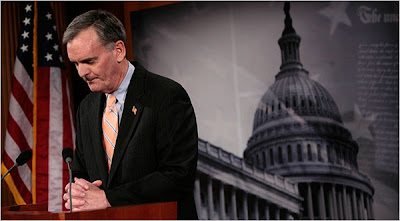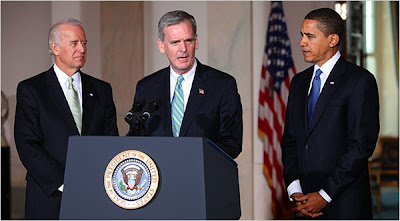Obama Has Plan to Slash Deficit, Despite Stimulus Bill

President Obama, speaking about foreclosures on Wednesday in Mesa, Ariz., is scheduled to release his budget this Thursday.
Mr. Obama’s budget outline, which he will release on Thursday, will also confirm his intention to deliver this year on ambitious campaign promises on health care and energy policy.
The president inherited a deficit for 2009 of about $1.2 trillion, which will rise to more than $1.5 trillion, given initial spending from his recently enacted stimulus package. His budget blueprint for the 2010 fiscal year, which begins Oct. 1, will include a 10-year projection showing the annual deficit declining to $533 billion in the 2013 fiscal year, the last year of his term, officials said.
While that suggests a two-thirds reduction, exceeding Mr. Obama’s goal of at least half, advisers note that the current deficit as a starting point is inflated by one-time expenses to stimulate the economy.
Measured against the size of the economy, the projected $533 billion shortfall for 2013 would mean a reduction from a deficit equal to more than 10 percent of the gross domestic product — larger than any deficit since World War II — to 3 percent, which is the level that economists generally consider sustainable. Mr. Obama will project deficits at about that level through 2019, aides said.
In his weekly radio and Internet address on Saturday, Mr. Obama said his first budget was “sober in its assessments, honest in its accounting, and lays out in detail my strategy for investing in what we need, cutting what we don’t, and restoring fiscal discipline.”
“We can’t generate sustained growth without getting our deficits under control,” he added.
The president will propose to tax the investment income of hedge fund and private equity partners at ordinary income tax rates, which are now as high as 35 percent and could return to 39.6 percent under his plans, instead of at the capital gains rate, which is 15 percent at most.
Senior Democrats in Congress joined with Republicans in 2007 to oppose that increase. But with Wall Street discredited and lucrative executive compensation a political target, the provision could prove more popular among lawmakers.
Mr. Obama will also call for letting the Bush tax cuts on income, dividends and capital gains lapse after 2010 for individuals who make more than $250,000 a year. But while the top rate for income would rise to 39.6 percent, the top rate for capital gains and dividends would be 20 percent.
As a candidate, Mr. Obama called for immediately repealing those tax cuts. He decided instead to keep them in place through 2010, as scheduled, reflecting the widespread belief that raising taxes further depresses economic activity.
As for war costs, Mr. Obama’s campaign projected that withdrawing combat troops from Iraq would save about $90 billion a year. But it is not clear how much any savings would be offset by increased spending in Afghanistan, where Mr. Obama has ordered an additional 17,000 troops, bringing the total there to 56,000.
The budget will provide the first clues to how Mr. Obama will reassert fiscal discipline after signing into law a $787 billion economic recovery plan. As difficult as cutting the deficits will be, much of the reduction by the end of his term will simply reflect an end to spending from the two-year stimulus package and — assuming the economy recovers — higher tax revenues and lower expenditures for safety-net programs like unemployment compensation.
Mr. Obama will propose cutting a variety of programs, including the Medicare Advantage subsidies for insurance companies that cover seniors who can otherwise acquire health coverage directly from the government. Another target is spending on private contractors, especially for defense, which spiked during the Bush administration. And he will scale back some promises, including his proposal to double money for foreign aid.
The budget on Thursday will come amid a week of reminders of the nation’s fiscal plight. On Monday Mr. Obama will hold a “fiscal responsibility summit” at the White House with members of Congress from both parties, economists, union leaders and business representatives. On Tuesday he will make a televised address to a joint session of Congress — the equivalent of a State of the Union speech for a new president — that advisers said would focus on the economy. Meanwhile, Congress will debate $410 billion in overdue appropriations for this fiscal year.
Yet Mr. Obama will inflate his challenge by forsaking several gimmicks that President Bush used to make deficits look smaller. He will include war costs in the budget; Mr. Bush did not, and instead sought supplemental money from Congress each year. Mr. Obama also will not count savings from laws that establish lower Medicare payments for doctors and expand the alternative minimum tax to hit more taxpayers — both of which Mr. Bush and Congress routinely took credit for, while knowing they would later waive the laws to raise doctors’ payments and limit the reach of the tax.
Full details of Mr. Obama’s budget for the 2010 fiscal year will be released in April. The outline on Thursday will make clear that he intends to push ahead on promises to contain health care costs and expand insurance coverage, and to move toward an energy cap-and-trade system for controlling emissions of gases blamed for climate change.
“The president believes there are essentially three areas that have to move forward even as we pare back elsewhere — health care, energy and education,” said David Axelrod, his senior adviser. “These are the bulwark of a strong economy moving forward.”
While some people have predicted that Mr. Obama would have to shelve his priorities given rising deficits, his determination to proceed, especially on health care, reflects his economic advisers’ conviction that the government cannot control its finances without reforming health care. The ballooning cost of health care, and thus Medicare and Medicaid, is the biggest factor behind projections of unsustainable deficits in coming decades.
“He wants to present an honest budget, he wants to focus on health care, and he will cut the deficit by at least half by the end of his first term,” Peter R. Orszag, director of the White House Office of Management and Budget, said in an interview.
Mr. Obama will suggest in his budget that expanding health coverage to the more than 46 million uninsured can be done without adding to the deficit, both by making cost-saving changes in the delivery of care and by raising revenues. Advisers declined to identify the tax source.
Changes to the health care system will require investments in disease prevention programs, health information technology and research on cost-effective treatments, among other steps. Some money was included in the stimulus package. Even so, many health analysts believe big savings cannot be realized soon.
On energy policy, Mr. Obama’s budget will show new revenues by 2012 from his proposal to require companies to buy permits from the government for greenhouse gas emissions above a certain cap. The Congressional Budget Office estimates that the permits would raise up to $300 billion a year by 2020.
Since companies would pass their costs on to customers, Mr. Obama would have the government use most of the revenues for relief to families to offset higher utility bills and related expenses. The remaining revenues would cover his proposals for $15 billion a year in spending and tax incentives to develop alternative energy.
By : Jackie Calmes (Published On : February 21, 2009)
A version of this article appeared in print on February 22, 2009, on page A1 of the New York edition.
Re-Published By : The Author

























+02.jpg)




 .
. 











